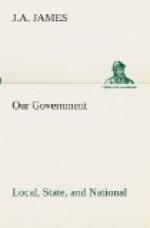Proportional Representation.—Proportional representation, which is coming into favor in these days, would doubtless do much toward remedying this abuse. According to the present system of electing representatives by districts, large minorities of voters are not represented. Numerous plans of “Proportional Representation” have been advocated. One such plan is in operation in Illinois[13] for the election of members to the State house of representatives. Each district elects three members on a general ticket. The voter may give one vote to each candidate, or one and a half votes to each of two candidates, or three votes to a single candidate. Therefore, the minority, by concentrating their votes on one candidate, may elect a representative to the legislature, when under the district system they would not be represented.
[Footnote 13: On proportional representation, read “Government in State and Nation,” pp. 14, 15.]
Qualifications of Representatives.—Section 2, Clause 2. No person shall be a representative who shall not have attained to the age of twenty-five years, and been seven years a citizen of the United States, and who shall not, when elected, be an inhabitant of that State in which he shall be chosen.
In the original States there was great diversity of qualifications for members of the lower houses of their legislatures. But some uniform system was necessary for the National organization, and so the few simple requirements of this clause were introduced. It is understood, however, that the States may not add other qualifications. While a representative must be an inhabitant of the State in which he is chosen, he need not, so far as the Constitution requires, be an inhabitant of the district. But the instances have been few in which a member of the House has not been also an inhabitant of the district which he represents. According to the English system of representation, a member of the House of Commons frequently represents a borough or county in an entirely different part of the kingdom from that of which he is an inhabitant.
May the House refuse to admit a person duly elected and possessing the necessary qualifications? This question arose in the 56th Congress, in the case of Brigham Roberts of Utah. He was finally excluded.
Present System of Apportioning Representatives.—Section 2 of Amendment XIV contains the rule of apportionment that is now in operation. This became a part of the Constitution, July 28, 1868.
Representatives shall be apportioned among the several States according to their respective numbers, counting the whole number of persons in each State, excluding Indians not taxed. But when the right to vote at any election for the choice of electors for President and Vice-President of the United States, representatives in Congress, the executive and judicial officers of a State, or the members of the legislature thereof, is denied to any of the male inhabitants of such State, being twenty-one years of age, and citizens of the United States, or in any way abridged, except for participation in rebellion or other crime, the basis of representation therein shall be reduced in the proportion which the number of such male citizens shall bear to the whole number of male citizens twenty-one years of age in such State.




